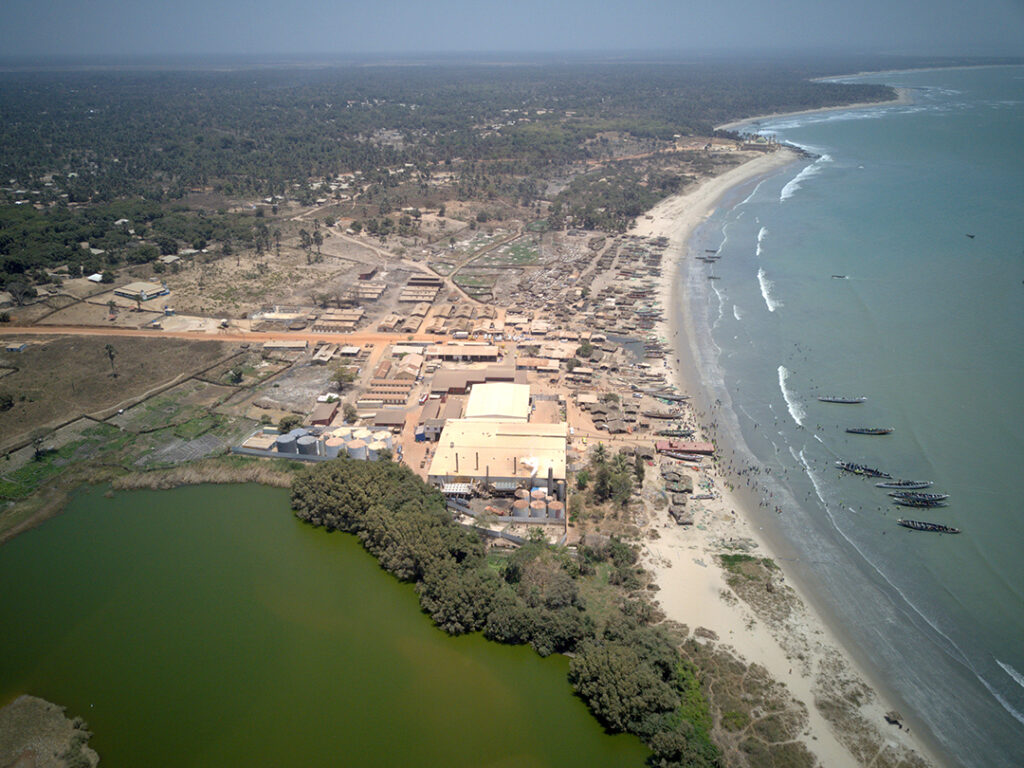ADF STAFF
Rampant overfishing, driven by the demands of the global fishmeal and fish oil industry, is leading to food insecurity in West Africa.
Artisanal fishermen around the region have angrily denounced the presence of fish oil and fishmeal factories, which they blame for decimating fish stocks, damaging ecosystems and reducing tourism revenue. The factories, mostly Chinese-owned and -operated, press sardinella, bonga and other species for oil and grind them into powder that is exported to feed livestock and farmed fish around the world.
Some of the farmed fish and shrimp then return to West Africa as expensive imported products. Depleted fish stocks also have caused local fish prices to skyrocket.
Many of the factories are supplied by foreign industrial trawlers, which are mostly from China. The country has the world’s largest distant-water fishing fleet and the world’s worst record of illegal, unreported and unregulated (IUU) fishing, according to the IUU Fishing Index.
For years, stakeholders in West Africa’s fisheries have expressed dissatisfaction with their governments’ handling of IUU fishing and the proliferation of fish-based feed factories. In March 2021, anti-factory protesters in The Gambia burned down a police station in Sanyang and torched the Chinese-owned Nessim Fishing and Fish Processing Co. fishmeal factory.
“West African governments have created an economic model that benefits the wealthy in developing economies rather than our own people,” Aliou Ba, senior oceans campaigner at Greenpeace Africa, told The Guardian. “West African states should get rid of these destructive industries and take their responsibilities in order to preserve food security, jobs and the wellbeing of populations.”
Food insecurity
In 2021, 23.6 million people in West Africa were projected to face crisis-level food insecurity —an increase of 40% from record levels in 2020, according to the Africa Center for Strategic Studies (ACSS).
Although the ACSS noted that COVID-19, conflict and political mismanagement contributed to the food crisis, the region’s fish stocks have been in rapid decline for decades, driving unemployment and hunger in fishing communities that long have relied on the seas for food and income.
The proportion of people considered to be food insecure in The Gambia has increased from 5% to 8% over the past five years, partly due to the fluctuating abundance of bonga that is targeted by the fish-based feed factories, according to a report by the United Nations Food and Agriculture Organization (FAO). About 200,000 Gambians rely on fishing and related work for income.
Many areas around the factories become so polluted that tourism grinds to a halt.
In Ghana, the first fish-based feed factory opened in 2011. Since then, at least three more factories have emerged, according to the FAO report. The effects on fish populations were drastic. Between 2012 and 2017, the annual total catch of small pelagic species dopped from 134,000 tons to 119,000 tons.
One species, sardinella aurita, is fully collapsed. Over the past 15 years or so, the average annual income per artisanal canoe has dropped by up to 40%, according to the Environmental Justice Foundation.
Between 2011 and 2018, seven new fish-based feed factories opened in Senegal, while the FAO reported that two more factories are under construction.
As in other parts of the region, the factories have dramatically reduced the supply of fish that has historically been caught, sold and consumed by artisanal fishermen and their communities.
“A holistic approach is required when assessing opportunities to enhance, optimize or reduce the use of fishmeal and fish oil for [fish-based feed] production,” the FAO report said. “The complexity of the situation must be comprehensively understood, especially in underdeveloped regions, and locally appropriate solutions will need to be developed in partnership with the relevant stakeholders.”

